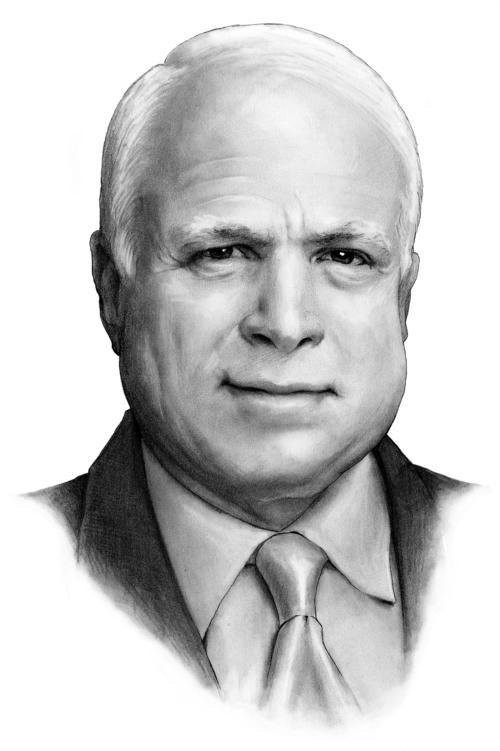
News
Summers Will Not Finish Semester of Teaching as Harvard Investigates Epstein Ties

News
Harvard College Students Report Favoring Divestment from Israel in HUA Survey

News
‘He Should Resign’: Harvard Undergrads Take Hard Line Against Summers Over Epstein Scandal

News
Harvard To Launch New Investigation Into Epstein’s Ties to Summers, Other University Affiliates

News
Harvard Students To Vote on Divestment From Israel in Inaugural HUA Election Survey
Underdog to the Rescue

Looking up to the crème-paned windows lining the streets of Harvard Square, the navy signs supporting “McCain-Palin” are most likely to catch the eye of an average Cantabrigian. In Cambridge, McCain is lemonade on a glacial morning or hot chocolate on a scorching summer afternoon. McCain is the brunt of Al Gore’s jokes and professorial grievances. McCain is the underdog, despite his policies that boost the job market, strengthen American independence, and grant our generation a promising future.
“It’s the bottom of the third quarter. We have to fight,” Dr. Al Felzenberg exclaimed to the Harvard Republican Club in reference to the campaign on October 14th. At a college where it is easier to profess mind-numbing love for Obama than face the outcry when you mumble, “Um, I’m not sure…”, students are apt to concede their votes to Obama.
Tercentenary Theater’s recent role as a venue for bottomless cider evidences a college constituency obsessed with the environment. Despite the ephemeral fanfare surrounding sustainability at Harvard, the United States will be dependent on carbon-based energy for the foreseeable future. Astronomic gas prices burden the economy, and hostile foreign governments supplying oil hold America hostage. McCain’s agenda would increase domestic drilling capacity, which would increase the oil supply, lowering gas prices and reducing American dependency.
Obama seeks not only to maintain restrictions on the domestic oil supply but also to impose a windfall profits tax on oil companies in order to provide a $1,000 rebate to families for purchasing gasoline. Under this corporate tax, the cost of production for domestic oil companies would increase. Companies would then decrease production, reducing supply, and increasing prices to consumers to an extent that offsets the rebate. Corporate oil taxes have been implemented–and have failed–before. Under the Carter administration, this type of tax proved to be inefficient, meaning that families might not receive a full rebate and possibly increasing the federal deficit.
Job creation likewise initiates contention on liberal college campuses. The US has the second highest corporate tax rate in the industrialized world at 39.3 percent. McCain plans to cut the corporate tax rate by 10 percent, encouraging businesses to hire more workers and remain in the US. Obama’s plans to raise the corporate tax rate would have the opposite effect; businesses would be forced to cut jobs and may choose to leave the US for a nation with lower taxes. Despite his recent rise to fame, Joe the Plumber may only have a future in Calcutta.
McCain’s support of free trade far outshines his opponent’s. Since its implementation in 1994, the North American Free Trade Agreement (NAFTA) has created hundreds of billions of dollars for the US through trade with both Canada and Mexico, maintaining and generating US jobs. McCain also supports the expansion of free trade by approving a free trade agreement with Colombia.
For college students concerned about their futures, McCain is the only logical choice. In the short-term, McCain wants to expand the Federal Family Education Loan Program that provides subsidies to lenders offering parent and student loans. In the long-term, his stance on social security makes sense for a generation being disinherited by the flawed institution. Obama’s proposal of increasing the income tax for social security pales in comparison to McCain’s introduction of personal accounts.
In the 1980’s, Republicans dominated the youth vote. Perhaps the stigmatization of relatively few issues repels socially liberal students. The connotation of “family values” conceals its universal appeal. Beyond Roe v. Wade and gay marriage–though both campaigns agree on the latter–lies the desire to achieve stable communities. Spending just under two months in Sociology 155: Class and Culture accentuates how often broken families adversely affect children and how easily these situations affirm poverty through jail rates, school dropouts, and future behavioral patterns.
Obama is a fantastic orator, a man who inspired a people disillusioned with the current administration. Yet, a vote for McCain is not a vote for Bush, and McCain called Obama out on this false accusation, announcing, “If you wanted to run against George Bush, you should have ran four years ago.” McCain reminds America, “I’m older than dirt, I’ve got more scars than Frankenstein, but I’ve learned a few things along the way.” There is no excuse for jumping on the Obama bandwagon while ignoring fundamental truisms. American wellbeing and security are at stake, and humanity is justifiably nervous. In these final moments, we have a chance to cling to an illusion of change or grasp a tried-and-true conductor of transformation.
Leave aside McCain’s credentials–his lifetime of service, his bipartisan politics, his ability to rally a party divided, his fierce following in Arizona–and focus on your own. The only concept more ingrained in Harvard students than the election is the vague concept of our mental superiority, our supreme privilege to walk into Harvard classrooms, and our uneasy discomfort with being the “chosen ones.” While we can debate the merits of these claims, let us instead use our mental gifts to choose the right leader for tomorrow: John McCain.
Rachel L. Wagley ’11, Secretary of the Harvard Republican Club (HRC), is a social anthropology concentrator in Quincy House. Peyton R. Miller ‘12 is a government concentrator in Wigglesworth. Andrew J. Crutchfield ‘12 is a government concentrator in Thayer. Both Crutchfield and Miller are General Board Members of the HRC. All three have worked on the McCain campaign.
Want to keep up with breaking news? Subscribe to our email newsletter.
